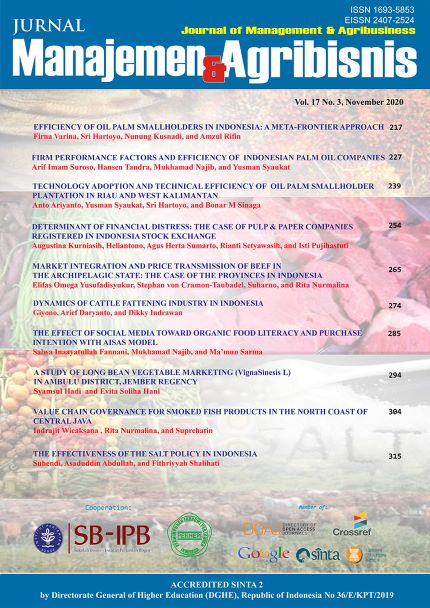EFFICIENCY OF OIL PALM SMALLHOLDERS IN INDONESIA: A META-FRONTIER APPROACH
Abstract
This research aims to evaluate the performance production and technical efficiency of oil palm production in Indonesia based on the management pattern (independent farmers and supported farmers). The secondary data were used from the Estate Cultivation Household Survey (ST2013 SKB) conducted by BPS-Statistics Indonesia. The empirical analysis involved using a meta-frontier approach, allowing one to decompose efficiency into group-level technical efficiency and technology gaps. The results indicate that the output of each management pattern behind their potential with the mean technical efficiency of 0,6789 and 0,7127 for independent farmers and supported farmers, respectively. The technology gap ratio statistics showed that the farmers had adopted the best available smallholder production technology in their farming. However, independent farmers were slightly more optimal than supported farmers. The efficiency measure generated from the meta-frontier revealed that supported farmers were more efficient, where the primary source of inefficiency came from managerial inefficiency. Thus, the policies to increase the production of oil palm smallholders must focus on the improvement of technical skills and managerial capabilities of farmers on the efficient use of resources and advanced technology by considering each characteristic of each management pattern.
Keywords: technical efficiency, independent farmers, supported farmers, oil palm, meta-frontier
Authors
Authors who publish with this journal agree to the following terms:
- Authors retain copyright and grant the journal right of first publication with the work simultaneously licensed under a Creative Commons Attribution License that allows others to share the work with an acknowledgement of the work's authorship and initial publication in this journal.
- Authors are able to enter into separate, additional contractual arrangements for the non-exclusive distribution of the journal's published version of the work (e.g., post it to an institutional repository or publish it in a book), with an acknowledgement of its initial publication in this journal.
- Authors are permitted and encouraged to post their work online (e.g., in institutional repositories or on their website) prior to and during the submission process, as it can lead to productive exchanges, as well as earlier and greater citation of published work (See The Effect of Open Access).

